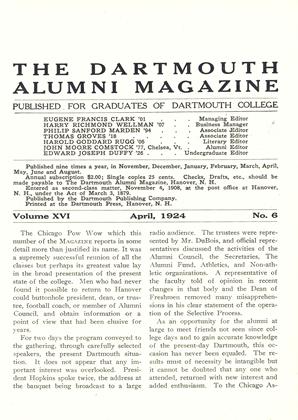President Hopkins, of Dartmouth, is now a target for criticism, because he recently defended his engagement, for his faculty, of a teacher who is known to have views on certain subjects which are deemed "radical." Dr. Hopkins says that he, himself, is not inclined to radical views of economic and social matters; that his own convictions are secure and his confidence in the arguments which have brought him conviction is deepseated and lasting.
And he has not reached conviction through ignorance of what the radicals have to say, but by thorough acquaintance with what they have to say, examination of it, and deliberate decision that it is all wrong. But when a man is a master of fact, is a fair-minded and high minded teacher of facts, his personal opinions about facts do not make him an undesirable companion of intelligent young men.
Dr. Hopkins says he would not be averse to having Trotzky on his faculty for a time if he were available. It would be interesting to hear Trotzky's own version of his experiences and of the attempted application of theories which he has abandoned. Probably this is an extreme indication of tolerance and perhaps not wholly judicious, but the argument holds true.
Passing the particular controversy as a minor matter, there is this to be said for the position of Dr. Hopkins and other managers of institutions of advanced education. If there is vast majority confidence that common sense is opposed to radicalism, that experience presents testimony against radicalism which cannot be denied and which convicts radicalism of mischievous and futile proposals, that the arguments for radicalism are powerless when sound judgment weighs them, then why be so afraid of radicalism that is content to present arguments for what they are worth?
Dr. Hopkins thinks that university men of the right sort are most immune of all men from specious argument. He is not afraid for his students, if exposed to theory of radicalism. Indeed, he believes that, if radicalism were permitted to do its argumentative best in colleges, it would be so discredited there that it would never be able to do its worst. This theory is at least worth attention.
For it is certain that our college students will meet radicalism when they leave college; possibly they might get over the first impact quite successfully and practically in college. We have some radicalism of the callow sort among college students, personally invented. A dose of the real thing, on the principle of "like cures like" might be helpful.
The Des Moines Register was another paper which failed to see an old and honored institution rushing with frenzied haste into the arms of Red Revolution. The Register's comment was the following:
"The point he was making is a good one. Unquestionably what he had in mind was merely that if the students of his college should have a chance to see and hear and judge such world figures, they certainly should not be deprived of it; that he had no fear of the effect upon his students of bringing them face to face with great leaders, even leaders of causes that we believe to be not only mistaken but highly destructive. In short, what he said indirectly was that he had no faith in the policy of hiding world facts as the basis on which to procure a safe functioning of democracy.
"Unquestionably he was so understood. And it is significant of American good sense that he was approved. It will be noted that he got applause, and that the meeting "included clergymen, jurists, and executives of large corporations." It would probably be a surprise to many people to know how large a proportion of the industrially eminent have really a hopeful view of the democratic experiment and really a confidence in the whole American people."
The chief dissenting note among the few which came to Hanover was the letter of Mr. R. M. Whitney, Director of The American Defense Society who wrote to President Hopkins as follows:
 View Full Issue
View Full Issue
More From This Issue
-
 Article
ArticleTHE POW WOW
April 1924 By E. Russell Palmer '10 -
 Article
ArticleIS THE COLLEGE EDUCATIONAL PROCESS ADEQUATE FOR OUR MODERN WORLD?
April 1924 By Charles Dubots '91 -
 Article
ArticleThe Chicago Pow Wow which
April 1924 -
 Class Notes
Class NotesClass of 1916
April 1924 By H. Clifford Bean -
 Class Notes
Class NotesClass of 1903
April 1924 By Perley E. Whelden, John P. Wentworth -
 Class Notes
Class NotesClass of 1903
April 1924 By Perley E. Whelden, John P. Wentworth







